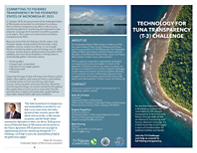Transparency for Tuna
The Federated States of Micronesia aims to show that sustainable fishing benefits people and the planet
Peter M. Christian and Mark Zimring
Peter Christian is President of the Federated States of Micronesia; Mark Zimring is Director of TNC's Indo-Pacific Tuna program
A cluster of small Pacific islands is poised to make history in the management of global fish stocks. As conservationists from around the world gathered at the fifth annual Our Ocean Conference in Bali, the Federated States of Micronesia (FSM) unveiled a bold promise and issued an even bolder challenge: full transparency in tuna fishing by 2023.
If FSM’s commitment is replicated, citizens of the Pacific could reclaim control over a natural resource that forms the backbone of the region’s economies. And it would promote future prosperity by helping to ensure that tuna stocks are fished sustainably, and that foreign vessels fishing in these waters do not take more than is permitted by law.
The mechanism that FSM and The Nature Conservancy will present this week is called the Technology for Tuna Transparency Challenge, a combination of monitoring and regional pacts aimed at improving fishing oversight. The initiative represents the first time a developing country has committed to 100% transparency in its fishery operations; if it succeeds, it could trigger a transformation of how seafood is managed worldwide.
FSM and the seven other island states that make up the Parties to the Nauru Agreement (PNA) may look like dots on the map, but they command an expanse of ocean greater than the size of Europe and are global powerhouses when it comes to fish. With control over half of the world’s supply of skipjack tuna and about a third of tuna stocks globally, the PNA is a veritable OPEC of the sea.

In FSM, efforts are already underway to use this market position as a force for good. Fish like tuna are important global commodities, but the industry is in steep decline worldwide. By committing to full transparency and pushing private partners to do the same, FSM will send a powerful signal that sustainable fishing practices are urgently needed to protect these crucial species.
But the real motivation behind FSM’s pledge lies closer to home. Tuna is more than a commodity here; it is what builds schools, pays teachers’ salaries, paves roads, and keeps hospitals open. It is the socioeconomic foundation of communities on the frontlines of climate change and rising sea levels. In other words, this is an existential fight – for the wellbeing of people today and the survival of island societies in the future.
FSM’s rich tuna fishery already provides half of the country’s income, but it could deliver even more. That is because too much of the value of tuna caught in local waters is being captured by foreign fishing fleets. Transparency is the key to bringing more of this wealth home. With electronic and human monitoring, we can stop illegal, unreported, and unregulated fishing, which robs the region of more than $600 million a year. Contrary to popular belief, most poaching is not the work of pirate operators; the major culprits are licensed foreign vessels that underreport or deliberately misreport their catch.
State-of-the-art electronic monitoring will also help ensure the sustainability of fish stocks and the communities they support. Currently, a lack of reliable monitoring data makes it difficult to establish protective fishing limits, and even harder to enforce them.
To remedy this, FSM plans to deploy remote sensors, GPS systems, cameras, and tracking devices on every longline vessel in its waters within five years. This will enable the collection of information such as catch composition, discards, and bycatch, which in turn will help minimize the accidental capture of sharks, turtles, and marine mammals. Crucially, these tools will also give authorities the data to manage ocean resources in real time. By joining FSM in these efforts, the PNA could raise the bar for transparency and set a new standard for fisheries management.

We already know that cooperation and conservation can reap big rewards. For example, since PNA-member states launched the Vessel Day Scheme in 2007 – which sets limits on fishing by foreign fleets – their annual tuna earnings have increased from about $60 million to more than $500 million. Pacific fisheries ministers are hoping to raise revenue even more by working with The Nature Conservancy to co-implement a system similar to one used in western Alaska, where the Community Development Quota Program (CDQ) has helped poor communities generate income by investing in fisheries-related businesses
The commitment to full transparency and the launch of a CDQ-type initiative for PNA states are intended to keep more tuna wealth in the Pacific. By promoting better fishing practices, we can increase regional revenue flows to rebuild and restore fisheries, boost food and job security, and strengthen resilience to climate change.
We believe that fish, marine ecosystems, and people can coexist and thrive, and that the road to sustainability runs through community empowerment. We hope this vision will be shared by FSM’s Pacific neighbors, consumer advocates, and fishing partners gathered in Bali this week. Protecting a third of the world’s tuna stocks could be just the start of the global transparency revolution needed to protect our oceans – and our future.
Originally posted on Project Syndicate
October 30, 2018
View Original
T-3 Challenge
Global Insights
Check out our latest thinking and real-world solutions to some of the most complex challenges facing people and the planet today.




